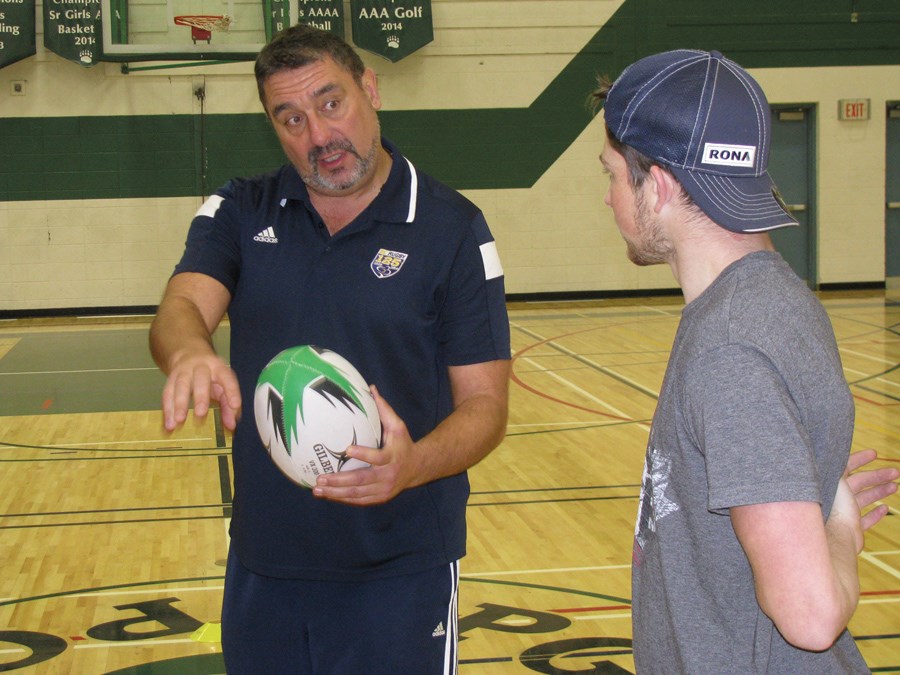Mabel McDermid has been watching Canada become a major player on the world stage in women's rugby and she's prepared to do whatever it takes to be a part of that progression.
Canada posted its best-ever finish last August when the national 15-a-side team finished second at the Rugby Women's World Cup in Paris and the women's sevens appear to have an excellent shot at qualifying for the 2016 Olympics in Rio de Janeiro.
That 16-year-old Prince George secondary school student was introduced to rugby two seasons ago in Smithers and last year played for her school team in Red Deer. This year she's brought her enthusiasm for the game to the PGSS Polars senior girls squad.
With opportunities for university scholarships and, ultimately, the chance to play for Canada internationally, McDermid is trying to convince more girls her age to take up the sport. She was one of four women and seven men who signed up for a weekend BC Rugby introduction to competition Level 2 coaching clinic offered by Kris de Scossa, a coach from the Burnaby Lake Rugby Club.
"I'm here because I want to learn more about the sport, I've taken real interest in it," said McDermid. "I've been practicing with UNBC's women's team and I plan on going further and trying to make Team Canada. The Olympics definitely interests me and it would be real fun to make Canada's 15s team.
"It's a lot more interesting than people think and you make a lot of friends playing rugby. it's not as dangerous as people think either. I'd say it's lot safer than other sports. You don't wear protection so there are lot of precautions you take to be safe."
De Scossa, 50, a native of Tanzania, played rugby professionally in Bath, England and has coached in England, Australia, Italy and Canada. He coached the Canadian national sevens and 15s and was an assistant for the women's World Cup team in 2010. While rugby thrives in the Lower Mainland and Vancouver Island, there are no northern B.C. leagues and De Scossa wants to develop one which involves Prince George, Smithers, Terrace, Prince Rupert and Haida Gwaii.
"This is for young people and teachers and coaches and it gives them an insight into just about every facet of the game through fun games and co-ordinated exercises that have the principles of the game and skill built in," said de Scossa. "The whole drive is to makes sure that it's fun. This is a game for life, however to get people playing that game they have to start somewhere. We know if we can introduce this game to young people it will be a fantastic foundation for all the other sports they play like football, basketball, hockey, lacrosse and soccer."
Across Canada, de Scossa says there's been steady growth in female rugby participation, fueled by the success of the national teams.
"The high school girls program is huge in Canada," he said. "Our national women's program is one of the best in the world. To have a silver medal in the Women's World Cup is massive and that's an end result of all the activity in the high schools. What other team sport can girls play where there's an element of competition and contact?"
Rugby will be a medal sport at the 2016 Olympics for the first time since 1924. Rugby had Olympic status in four Summer Games -- 1900, 1908, 1920, and 1924 -- when it was a 15s competition, but it was for males only. Qualifying for the Olympics starts today in Dubai, the first of six international tournaments in the seven-a-side season.
Throughout his 14 years as PGSS girls team coach Jeremy Greenfield has tried to get more high school athletes -- male and female -- involved in rugby. Key in that recruitment drive is convincing parents to let their kids play.
"Rugby's a tough sport and some people think it's smash-and-smash game -- the kids are kind of shying away and we're trying to build it up," said Greenfield, an NCCP-certified coach and referee. "We're promoting a safe program; I let my daughter play and there are some opportunities. Right now there's a huge Olympic push and they're picking up athletes to try to get players for the next sevens [national] teams."
Rugby season in B.C. high schools starts at the beginning of February and ends with the provincial championship in late April. For teams in the north, which for weather reasons can't get on the fields until May, that weighs heavily against them competing at the provincial level. To clear that obstacle, teams in the north central zone play from May to June and have special permission to compete in a shortened seven-a-side fall season from September until the snow flies.
PGSS has the only high school girls team in the city but Greenfield says the success of the Highlanders club team program in the summer has led to a resurgence of interest at Duchess Park, with Jeremy Cundy and Lauren Matters as coaches. Last season in the boys seven-a-side program, Duchess Park and D.P. Todd were the only teams involved.
"We haven't had a boys team at PGSS for a couple years now, it's petered off because we haven't had the coaching," said Greenfield. "We've been putting a lot of effort on the boys side to try to get the football kids out, because it's in their off-season, sort of, and we're letting them know it's a great opportunity to cross-train. It doesn't matter what body size, type, or shape, there's a job for you and all you need to play is a pair of shorts and a mouthguard."



